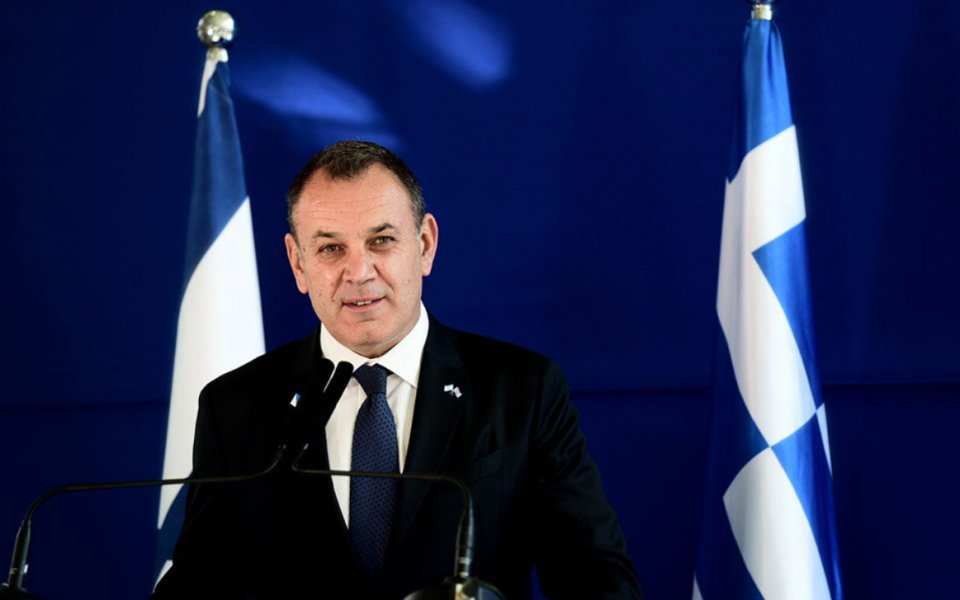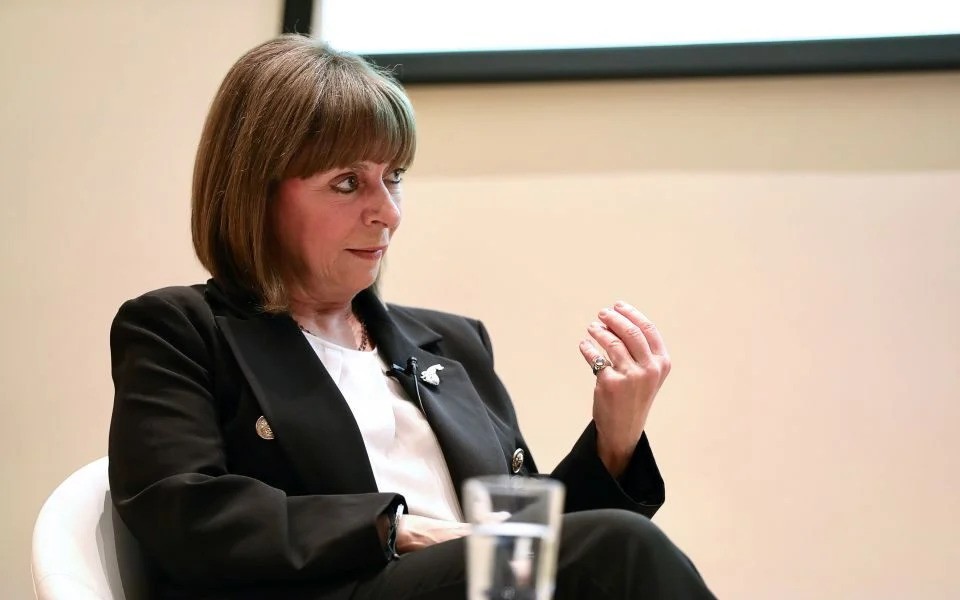Greece Defense Minister announces further reinforcement of Greek defensive capabilities


In this interview with Kathimerini, Defense Minister Nikos Panagiotopoulos clarifies Greece’s decision to further reinforce its defensive capabilities. He says that we can expect decisions on new corvettes, the acquisition of new guided missiles from Israel and upgrades of Block 50 F-16 fighter jets and Leopard battle tanks, while also stating that relations with France and the United States are strengthening. As he points out, the United States is interested in including the country in the next-generation F-35 fighter jet program, while Greece has asked that the US consider supplying it with unmanned aerial vehicles (UAV) and arms of “high operational value.”
At the same time, Panagiotopoulos also heralds closer collaboration with France and the visit of the Charles de Gaulle aircraft carrier to the port of Piraeus by the end of March.
On the decision to send defensive materiel to Ukraine, the minister stresses that there is no time for “yes but” when there is a European war raging. He also believes that the Russian invasion of Ukraine will have an impact on relations between Greece and Turkey without it necessarily meaning that the situation will be exacerbated, highlighting that Greece is both a member of NATO and the European Union.
– The Russian invasion of Ukraine has rapidly altered the post-Cold War balance. How do you believe Greece will be affected?
The Russian invasion of Ukraine did not just bring war about Europe in the 21st century in a flagrant violation of international law and legitimacy; it also struck a significant blow to the security architecture of Europe. As a result, Greece is clearly affected by this huge geopolitical destabilization, with a real danger that this crisis could escalate and spill over into the wider region. There is also the odious economic fallout that will inevitably accompany the war. We should also not forget the unavoidable economic cost of the sanctions imposed on Russia. However, there is no margin for comfortable accounting. The international community must make it crystal-clear that there can be no fait accompli over Ukraine. A return to the rule of law is the only fundamental prerequisite for any solution.
– Apart from the mobilization of NATO, there were also several important announcements on an EU level over the last few days, especially with some member-states like Germany, which maintained a restrained attitude toward defense. Do you think that Europe is moving toward closer defense collaboration? If so, how can Greece benefit from this?
Greece has always been a trailblazer in European defense. From the very beginning, Greece has supported defense initiatives assumed on a European level and, as a member of the Permanent Structured Cooperation (PESCO), has assumed responsibility and leadership for six important PESCO programs. Furthermore, joint defense programs in which Greek companies have a leading role are already being funded by the European Defense Fund (EDF). Over the last two years, we has been forced to spend billions of euros to improve the combat capabilities of our Armed Forces, as we are compelled by the strategic security challenges that we face in our immediate neighborhood and beyond. The EU holds the key for state budgets, as it can determine the extent of spending, including defense spending, on a fiscal level. Europe, as an institution, must understand this reality, as our defense spending goes toward the protection and defense of the EU borders. This must be recognized.
However, it is also time for the member-states of the European Union to spend more on the collective security of the EU. I believe that the stated intent of several member-states, including Germany, to increase their defensive budgets is a positive development. The events in Ukraine demonstrate the need for meaningful European strategic autonomy: autonomy in decision making, in choices, in action. We must act as a strong and cohesive political factor in support of the values and principles that underpin our democracies and assume greater responsibility for our own security while promoting world peace with our partners. Now is the time to act in unison.
– Greece responded by sending defensive materiel to Ukraine. How was that decision reached?
Ukraine submitted an official request for aid from all member-states of the EU and NATO. After consulting with our partners and allies, and according to the decision by the Council of Europe on providing aid to Ukraine, the country’s top decision-making body on foreign affairs and defense matters, KYSEA, decided to dispatch defensive materiel, medical supplies and significant humanitarian aid via the Polish border. As Prime Minister Kyriakos Mitsotakis said in his parliamentary speech, there are no dilemmas for Greece. We are on the side of Ukraine, we are on the side of peace, legitimacy and democracy. Athens stands with all the Western capitals in imposing sanctions on Russia. We are making every effort to protect the Greek community in the country, and we are supporting Ukraine diplomatically, humanitarianly and defensively. Besides, the EU, for the first time ever, will fund the supply of equipment, worth 450 million euros, to Ukraine, a country that is under attack and fighting for its survival. We agree with this decision, and it marks the stirring of the EU to confront a clear security threat. War has broken out on European soil; we cannot confront this reality using a “yes but” mind-set.
– Over the last two and a half years, the government has been upgrading and renewing the Armed Forces. Following the Rafale fighter jets and the frigates, what are the next steps?
Reinforcing the Armed Forces is a necessary prerequisite for protecting our country. Of course, these efforts have not concluded with the Belharra frigates and the Rafale fighter jets. We are continuing to work toward this goal, and we have recorded tangible and quantifiable results. Since September 2020, we have activated several sub-programs for all three branches of the Armed Forces, including, among others, the continued support for the Mirage 2000-5 fighter jets that had been paused since 2012, as well as tenders for the continued support for our C-130 and C-27 transport aircraft and CH-47D Chinook and NH90 helicopters, new high-tech torpedoes for our submarines, while we are ramping up the upgrade of 83 F-16 fighter jets to the Viper configuration.
Our efforts are constant and have as their goal the reinforcement of our Armed Forces, which we should not forget are already able, combat-effective, and an important deterrent factor. But as time goes by, existing systems need upgrades, support, maintenance, and they must be complemented by the acquisition of cutting-edge technology. This is the reason why we are soon going to be planning the acquisition of new units, probably corvettes, the modernization of the Hellenic Navy’s MEKO-class frigates, the acquisition of high-tech guided missiles from Israel, and the completion of an upgrade program for our F-16 Block 50 fighter jets. At the same time there are planned modernization programs to increase the capabilities of our ground forces.
– You are in discussions with German companies to create a channel for supporting and manufacturing Leopard battle tanks. Where are you with this endeavor?
In the wider framework of reinforcing our Armed Forces, we are collaborating with companies from not only the German defense industry but the international market. A standout example of our collaboration with German companies is the contract that was recently approved by the Hellenic Parliament on the acquisition of 44 new torpedoes for the Hellenic Navy that will fully modernize the operational capabilities of our submarines.
Additionally, I met with my German counterpart on the sidelines of the recent Security Conference in Munich, and we agreed to strengthen the defensive collaboration of Greece and Germany in areas that will be mutually beneficial for the defense industries of both countries. It is in this framework that our Leopard battle tanks, which are in need of immediate modernization, could be included. Negotiations with big companies from the German defense industry to cover the needs of the Hellenic Army on favorable terms and which will include the participation of the domestic defense industry have been ongoing for some time. I believe that the current confluence of events gives us an excellent opportunity to have beneficial results soon.
– You had a brief chat with your Turkish counterpart on the sidelines of the NATO summit. Are the communication channels with Hulusi Akar still open? Has communication helped overcome problems between our two countries?
I believe it is always good to have open lines of communication, including between defense ministers. The meeting with my Turkish counterpart a few days ago in Brussels was conducted in this spirit. Both sides are committed to the immediate use of this channel of instant communication to reduce any future escalations. On my part, during meetings with Akar, I always stress that we cannot make one step forward to immediately take two steps backward due to the provocative actions of our neighbor. The key issue in my opinion is to have some tangible evidence, even if it is tiny steps, that we are moving toward de-escalation between our two countries. De-escalation in our relations with Turkey requires respect of international law, sovereignty, each country’s sovereign rights, and the principles of good-neighborly conduct. Only after these prerequisites are met can we begin proposing the carrying out of initiatives in a framework of confidence building measures.
US considers Greece a reliable regional partner
– How can the Mutual Defense Cooperation Agreement (MDCA) and other materiel procurement programs be utilized to reinforce gaps in the Armed Forces? Will we see developments in 2022?
The strategic partnership between Greece and the United States, especially following the recent renewal of the MDCA, has been unprecedentedly strengthened and broadened in scope, while also creating new prospects for the further development of bilateral cooperation. As you may be aware, the American side has expressed its readiness to accept Greece into the 5th generation F-35 fighter jet program. At the same time, they have expressed an interest in our armament programs, including the modernization of the MEKO-class frigates and the further reinforcement of the Hellenic Navy with new surface units. For our part, we are looking at the possibility of acquiring UAV and other high operational value arms.
This framework of cooperation also includes the acquisition of anti-submarine warfare MH-60R helicopters by the Hellenic Navy and the transfer of 1,200 surplus M-1117 Armored Security Vehicles from the United States Army to the Hellenic Army. The United States now considers Greece to be a pillar of stability and a reliable partner in the region. As a result, it is open to any conversation on the reinforcement of the total capability of our country’s Armed Forces.
– How does the defense agreement with France manifest itself in the collaboration between the two countries’ armed forces? Will we see a significant French military presence in Greece, and, if so, what will it look like?
Last September we signed an agreement between the Greek and French governments establishing the the creation of a strategic partnership and cooperation in defense and security, which upgraded the strategic significance of both countries to its highest level. This included a mutual defense clause that will be activated if any of the two countries is subject to an attack on its sovereign territory, as defined by Article 51 of the United Nations Charter. This crucial moment in our defensive cooperation reflects the strong desire of France and Greece to reinforce and broaden our defensive cooperation both bilaterally, but also as partners within the EU and allies within NATO, as is stated in the deal itself. We are united not only by our history as traditional allies, but also by our pursuit of peace and stability in the wider region of the Eastern Mediterranean.
In the framework of implementing the agreement, the Chief of the Hellenic National Defense General Staff and his French counterpart signed an agreement in January on the guiding principles of upgrading Greek-French defense cooperation, which sets out and defines the realization of the Greece-France military agreement. This includes cooperation on an operational level, operational training, exchange programs for personnel in military schools and educational organizations, space, cybersecurity, intelligence, joint training for special forces units, as well as cooperation between the branches of the armed forces of both countries. By extent, the cooperation between the French and Greek armed forces was given a roadmap, whose implementation has already begun. By the end of March, we expect the arrival of the French aircraft carrier Charles de Gaulle at the port of Piraeus, while French aircraft will participate in the multinational, inter-service military exercise Iniochos 22. Joint actions between the armed forces of our two countries will continue and will be reinforced.
Source: Ekathimerini.com





